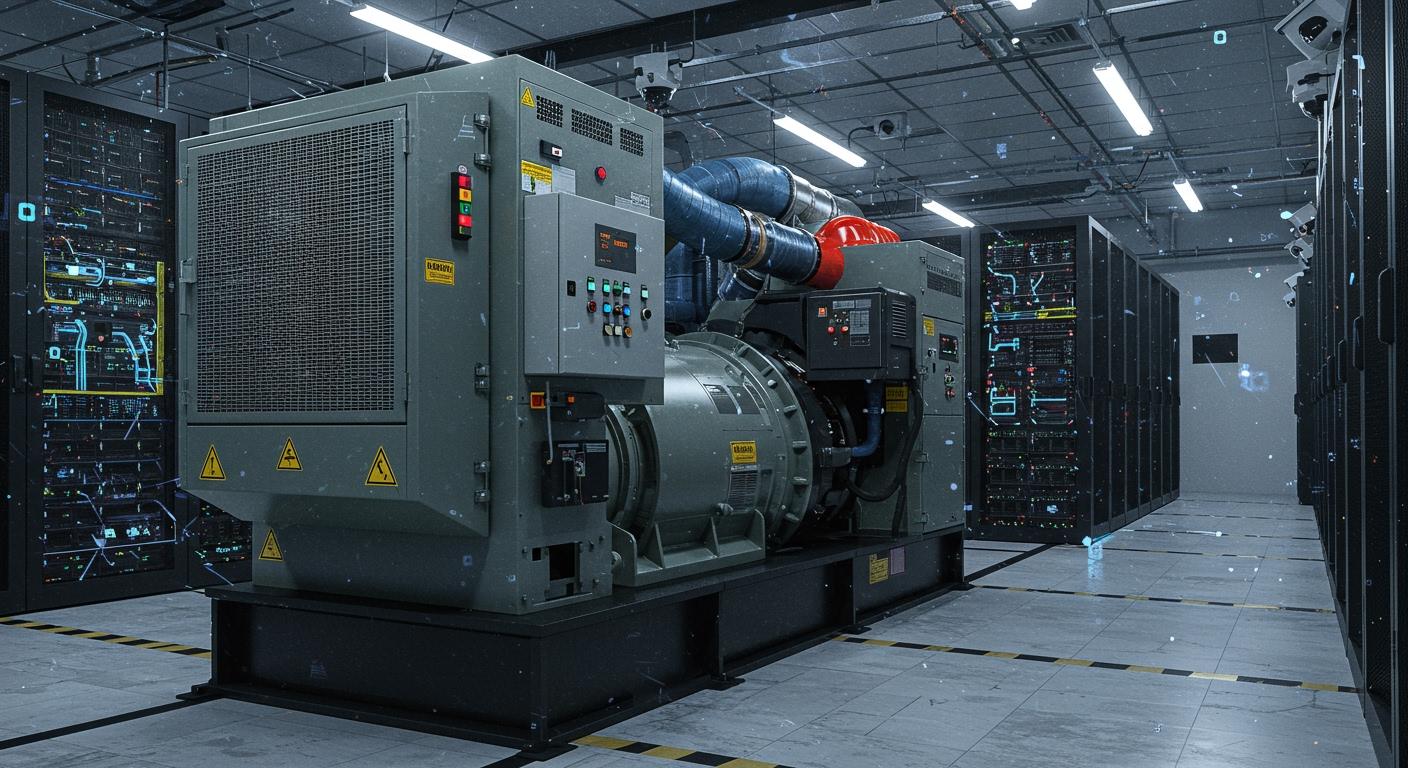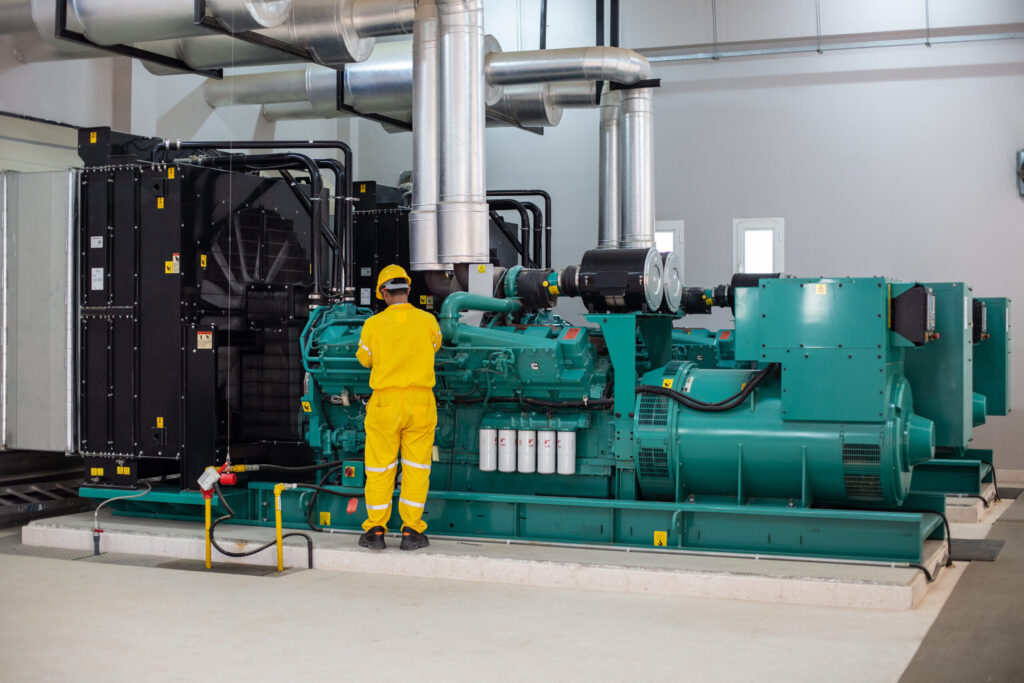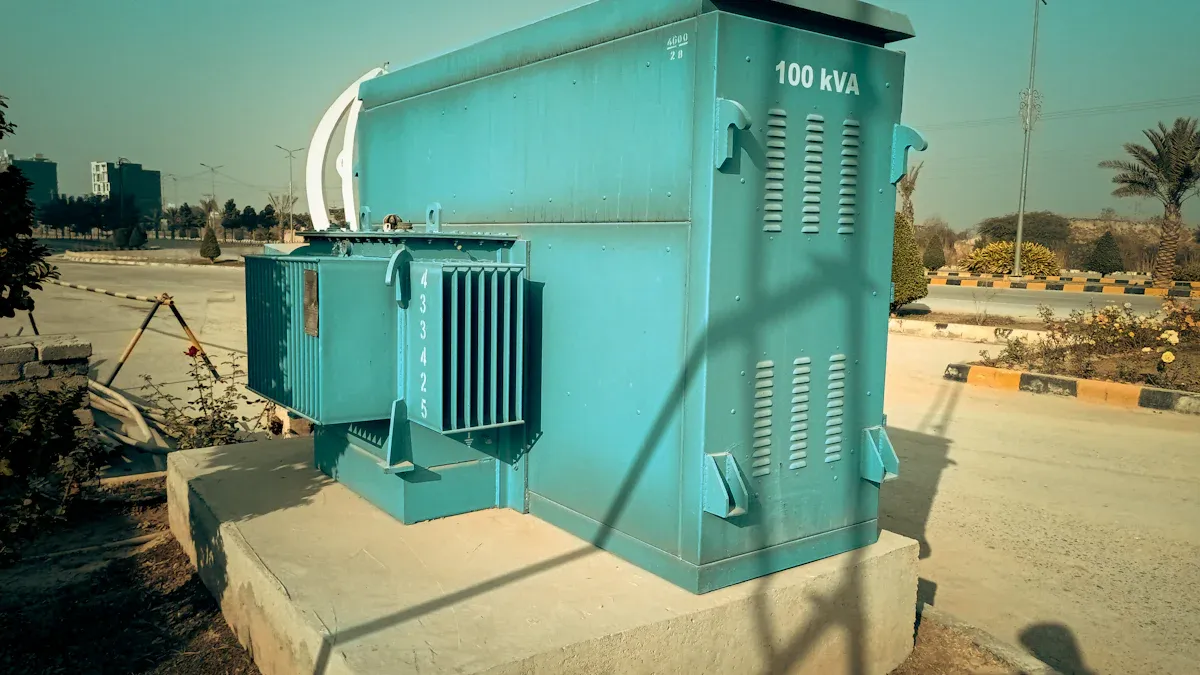
Data centers rely on several main types of generators to maintain operations during power outages, including diesel generator for data center, natural gas generators, and hybrid generators. Having a reliable backup power source is crucial to ensure your data center remains operational.
- A UPS (Uninterruptible Power Supply) with diesel generator for data center enables unrestricted system operation, avoiding costly outages or potential data loss.
- When the power goes out, UPS systems backup your most important equipment to keep you running.
- They are solutions that keep sensitive equipment away from power threats and help hardware extend it’s life.
Diesel generator for data center may be the best option in the opinion of many industry professionals to meet reliable and consistent backup power.
Generator Types

Diesel Generator for Data Center
Data center diesel generator is very critical. It’s the primary alternative power source in most places. This generator spins up quickly when the power goes out. It can support large volumes of electricity. Many companies, including Microsoft, rely on diesel generators for emergencies and testing. Diesel generators have the edge when it comes to reliability and strength, experts say.
Diesel generators keep your data center working. Even a short power loss can stop work and cost money.
Diesel generators are used in most data centers:
| Generator Type | Market Share (%) |
|---|---|
| Diesel Generators | 70.5% |
| Gas Generators | N/A |
| Other Types | N/A |
You can pick a diesel generator for data center with different power levels. They can be from 1000 kW to 3000 kW. Different places need different sizes:
- Small Commercial: 100 – 300 kW
- Medium Commercial: 500 – 1,000 kW
- Large Commercial / Small Industrial: 1,000 – 2,000 kW
- Medium Industrial: 2,000 – 4,000 kW
- Large Industrial: 4,000+ kW
Natural Gas Generators
Natural gas generators are a cleaner backup power choice. You might pick this if you have a good gas supply. These generators make less pollution than diesel ones. They can run for a long time. But if a disaster stops the gas, they may not work.
Bi-Fuel Generators
Bi-fuel generators use two fuels, usually diesel and natural gas. You can change fuels if you need to. This helps save money and lower pollution. Here is a table to compare:
| Feature | Bi-Fuel Generators | Single-Fuel Generators |
|---|---|---|
| Fuel Usage | Use two fuels but only one at a time | Use one fuel type only |
| Flexibility | Can switch fuels for better efficiency | No switching allowed |
| Emissions | Less pollution than single-fuel | More pollution |
| Cost Efficiency | Saves money by using the best fuel | Costs stay the same |
Hydrogen Fuel Cell Generators
By now, hydrogen fuel cell generators have become a much more recognised and even trending type of power generator for that matter. These you might need if you care about the environment. The government hands out money to help with the purchase of hydrogen fuel cells. Some companies are experimenting with hydrogen fuel cells as a replacement for diesel generators. The main problem is obtaining sufficient clean hydrogen.
- They’re good for the planet and work well.
- Government money enables people to buy one.
- Even getting enough hydrogen is still difficult.
Microturbine Generators
Microturbine generators produce power using natural gas or other fuels. They are tiny and can, in fact, generate heat. Efficiencies of up to 80% can be achieved with these systems. Mike Funke/AWEA Microturbines are ideal for a locati0n that needs both power and heat. And they may not provide enough power for data centers of big size.
- When you make heat and power microturbines are highly efficient.
- They are ideally suited for small or niche data centers.
Propane Generators
Propane generators are used when diesel or gas is not there. You might use them in far away places or where fuel rules are strict. These generators burn clean and are easy to store. But propane can cost more than other fuels.
Battery Backup Systems
Battery backup systems give power right away when the lights go out. You use them to keep things running until generators start. Big data centers use batteries for 5–10 minutes. This gives time to start generators or shut down safely.
| Key Consideration | Details |
|---|---|
| Critical Load (in kW) | Pick what needs backup power. |
| Desired Runtime (in minutes) | Usually for 5–10 minutes. |
| Purpose | Gives time to start generators or shut down. |
- Battery systems give quick, short power.
- They cover the few seconds before generators start.
- You can make battery systems very big.
- Batteries can last 4 to 8 hours if needed.
- They keep power steady and stop spikes or drops.
Tip: Always use battery backup systems with a diesel generator for data center. This keeps your power on without any breaks.
Pros and Cons
Diesel Generator for Data Center
A diesel generator for data center is very reliable. It gives strong power and starts fast when needed. You can pick from many power sizes, from 10 kW to 2.5 MW. This makes it good for both small and big data centers.
Advantages:
| Advantage | Description |
|---|---|
| Reliability | Known as the best backup power. |
| Load Carrying Capacity | Handles heavy loads, great for important data centers. |
| High Quality Electrical Power | Gives steady, clean power to protect equipment. |
| Rapid Response Time | Starts up fast, so downtime is short. |
| Affordability | Costs less than many other backup choices. |
| Fuel Access | Diesel fuel is easy to find, even in emergencies. |
| Self-Contained Fuel Storage | Has its own tank, so it does not need outside fuel. |
| Service and Support Network | Easy to get help for repairs and maintenance. |
Diesel generators are strong and last a long time. If you take care of them, they can work for thousands of hours. This means you do not have to buy new ones often.
Disadvantages:
| Disadvantage | Description |
|---|---|
| Environmental Concerns | Makes a lot of CO2 and pollution, which hurts the planet. |
| Maintenance Requirements | Needs oil changes and service often, which can cost a lot. |
| Operational Challenges | Heavy and hard to use in cold weather. |
Natural Gas Generators
Natural gas generators are cleaner than diesel ones. You might pick these if you want less pollution and a steady fuel supply from pipes.
Pros:
- Makes less air pollution than diesel.
- Sometimes runs more quietly.
- Gets fuel all the time if pipes work.
Cons:
- Still makes more carbon dioxide than green energy.
- Getting and moving natural gas can hurt nature.
- Can be noisy for people living close by.
- May let out harmful metals and other bad stuff.
| Aspect | Natural Gas Generators | Diesel Generators | Renewable Energy Sources |
|---|---|---|---|
| Air Emissions | Lower | Higher | Much lower |
| Carbon Dioxide Emissions | Higher than renewables | Lower | Lowest |
| Upstream Environmental Impact | Yes | N/A | N/A |
| Noise Pollution | Yes | Yes | N/A |
| Toxic Heavy Metals Emissions | Yes | N/A | N/A |
Bi-Fuel Generators
Bi-fuel generators let you use diesel or natural gas. This gives you more choices and can save money.
Pros:
- Use the fuel that is cheaper or easier to get.
- Makes less pollution than only using diesel.
- Helps you keep working if one fuel runs out.
Cons:
- More parts mean more things to fix.
- Costs more to set up at first.
- Might not work as well as single-fuel generators.
Hydrogen Fuel Cell Generators
Hydrogen fuel cell generators are a green way to get backup power. You might want these to help the environment.
Pros:
- No pollution where you use them.
- Runs quietly.
- The government may give money to help buy them.
Cons:
- Making and bringing hydrogen is hard and costs a lot.
- Not many places have hydrogen delivery yet.
- Costs more to buy than diesel.
- Does not like big changes in temperature.
- Hydrogen can catch fire, so safety is important.
- Hydrogen can leak when stored or moved.
Microturbine Generators
Microturbine generators are fueled by natural gas or other sources. They generate both power and heat. These are good for small data centers, or spaces that want heat and power.
Pros:
- Very efficient and particularly effective when you’re dealing with waste heat.
- Compact size to fit into tight places.
- Makes less pollution than diesel.
Cons:
- May not provide enough power for large data centers.
- Requires frequent refueling, recharging and cooling checks.
- Good records keep them working well.
Propane Generators
Propane Generators Portable generators that run on propane are great for use in remote locations. They operate in places where diesel and natural gas are hard to obtain.
Pros:
- Burns clean, so less pollution.
- Easy to store and move.
- Great for communities with tight fuel rules.
Cons:
- Propane is not always cheaper than diesel or gasoline.
- Shorter tanks so they don’t run as long.
- Not heavily used for very large data centers.
Battery Backup Systems
Battery backup systems give power right away if the main power stops. You use them until the generator starts.
Pros:
- Gives power fast, so nothing shuts off.
- No pollution when running.
- Keeps equipment safe from power spikes or drops.
Cons:
- Only works for a short time, about 15 minutes.
- You must plan carefully to get the right size.
- Not good for long power outages.
- Design rules can be different at each data center.
Tip: Always use battery backup systems with a diesel generator for data center. This keeps your power on all the time.
Choosing a Generator

Power Needs
First, you need to know how much power your data center uses. Make a list of all circuits and what they power. Include both electrical and mechanical systems. Do not forget extra accessories. These can make your total power needs go up by 65%. Always think about how your data center might grow. Check the biggest load your system can take after 10 seconds. The size and strength of your transfer boards are important for handling power. Your budget also helps decide which generator you pick.
| Factor | Description |
|---|---|
| Number of circuits | List all loads you want to connect. |
| Types of loads | Include both electrical and mechanical. |
| Peripheral accessories | These can add up to 65% more power. |
| Anticipated load factor | Shows how much equipment you use, often 50%. |
| Future growth | Plan for more power if you add equipment. |
| Allowed limits | Check the most power used after 10 seconds. |
| Size and capacity of transfer boards | Helps manage all the power safely. |
| Budget availability | How much money you have for buying equipment. |
Fuel Source
The fuel you can get changes what generator you use. Some places have power limits, so you may need backup. Check if diesel, natural gas, or renewable fuels are easy to find and store. Local rules and prices matter too.
- Data centers need power sources that are steady and can grow.
- Always look at how you will store fuel and follow local laws.
Emissions
You must follow rules about pollution. In the United States, the EPA makes rules for diesel generators. Tier 4 Final is the strictest rule. California has even tougher rules. In Europe, Stage V rules are used. These rules also cover very tiny particles.
| Region | Standard Type | Key Details |
|---|---|---|
| United States | EPA Tier Standards | Tier 4 Final is the hardest; standby generators use Tier 2 or 3. California has stricter rules. |
| European Union | Stage V Standards | Like EPA Tier 4 Final; adds rules for very small particles. |
Note: The Clean Air Act and state laws also affect which generator you can use.
Reliability
You want a generator that works every time you need it. Diesel generators give strong power and you can get fuel almost anywhere. But you must watch your fuel supply. Natural gas generators use utility lines, but might stop in big blackouts. New fuels like HVO work in diesel engines and make less pollution.
- Diesel generators are still the best for big data centers.
Cost
Cost is more than just buying the generator. You must think about fuel, repairs, and following local rules. Diesel generators usually cost less to run and fix. They also work well for big data centers.
| Feature | Description |
|---|---|
| Reliability | Diesel generators give backup power right away. |
| Fuel Efficiency | New diesel generators use less fuel. |
| Rapid Response Time | They start fast, so you lose less time. |
Diesel generators are a top pick for big data centers. They are reliable, use fuel well, start quickly, and do not cost too much.
You can pick from many generator types for your data center. Each one has good points and bad points.
| Generator Type | Key Benefits | Drawbacks |
|---|---|---|
| Diesel Generators | Works well and is very reliable for big centers | Needs lots of space and regular checkups |
| Natural Gas Generators | Makes less pollution and can save money | Needs gas to work and gives less energy |
| Bi-Fuel Generators | Can use two fuels and makes less pollution | Harder to use and costs more at first |
| Hydrogen Fuel Cell Generators | Makes no pollution and is very quiet | Costs a lot and is not easy to set up |
| Microturbine Generators | Saves energy and makes less pollution | Costs a lot to put in and not used much |
| Propane Generators | Burns clean and is easy to store | Needs bigger tanks and gives less power |
| Battery Backup Systems | Gives power right away and helps until generators start | Only works for a short time and needs care |
A diesel generator for data center is still the most used. It gives strong backup power and meets tough rules for always working. When you pick a generator, think about how well it works, how much it costs, how much power you need, what fuel it uses, and how to take care of it. What you choose will affect how well your data center works for a long time.
FAQ
What is the most reliable generator for data centers?
Diesel generators are the most reliable choice. They start up fast and give steady power. Many data centers use diesel because you can keep fuel at your site. It is also easy to get help if something breaks.
How long can a data center run on backup generators?
A data center can run for hours or days on backup generators. The time depends on how much fuel you have and how big your generator is. Always check your fuel and plan when to get more.
Do battery backup systems replace generators?
Battery backup systems do not take the place of generators. Batteries help keep things running for a short time. Generators are needed for longer power outages.
Are hydrogen fuel cell generators safe for data centers?
Hydrogen fuel cell generators are safe if you follow safety rules. You need to store hydrogen the right way and use the right tools. Many companies use these for clean backup power.
What factors should you consider before choosing a generator?
You should think about how much power you need, what fuel you can get, rules about pollution, how reliable it is, and how much it costs. These things help you pick the best generator for your data center.
